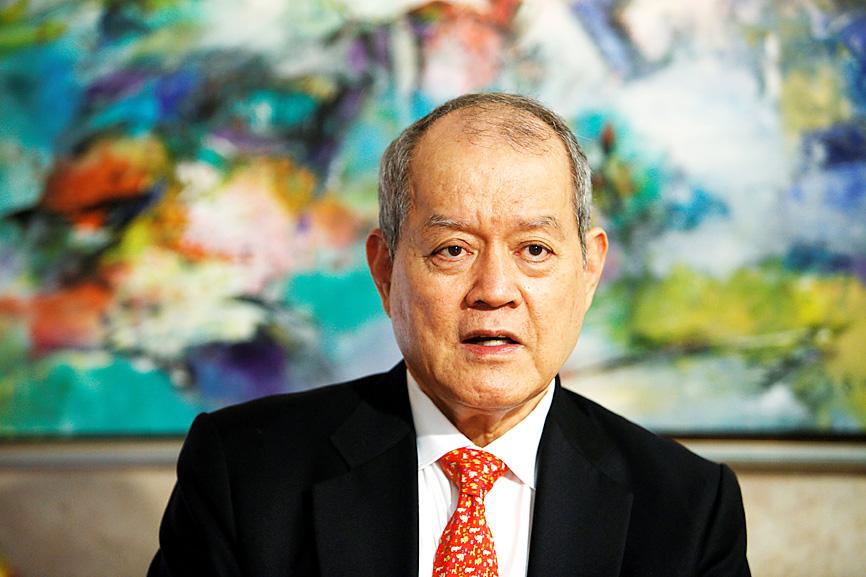Bank of China Ltd (中國銀行) has sued BP PLC in Singapore over its alleged role in fabricating oil deals with collapsed trader Hin Leong Trading Pte Ltd (HLT, 興隆貿易), in the latest effort by a creditor to recover losses after one of the biggest trading scandals in decades.
The Chinese bank requested that BP repay US$125.7 million that it withdrew from the lender earlier this year based on sales of gasoil cargoes to Hin Leong, documents provided by the Supreme Court of Singapore showed.
The deals were part of “fictitious purchase scheme conspiracy” to maintain Hin Leong’s liquidity since no real transactions took place, the bank said.

Photo: Reuters
The lender also demanded US$187.2 million from Hin Leong founder, Lim Oon Kuin (林恩強), and his two children, the documents showed.
The total sum includes the deals linked to BP and some other overdue payments on short-term loans, or letters of credit.
BP strongly refutes the allegations by Bank of China and would defend its position, the company said in a statement, without elaborating.
Lim has earlier denied forging documents in a case brought by HSBC Holdings PLC, saying they were “mistakenly” issued.
Hin Leong’s creditors, which also include HSBC and Singapore’s DBS Group Holdings Ltd, are fighting to recover funds from the insolvent firm, which has US$3.5 billion in outstanding debt.
Bank of China’s case, filed in late last month, came after HSBC and the trader’s court-appointed managers PricewaterhouseCoopers started taking legal action against the Lim family.
The disputed gasoil deals took place in the first two months of this year, when BP withdrew a total of US$125.7 million on three letters of credit in early February from Bank of China, the court document showed.
Hin Leong purchased a combined 1.5 million barrels of gasoil from BP in the deals and the oil major was able to present documents to prove the authenticity of the trades.
Hin Leong’s judicial managers later informed the bank that these trades were fabrications backed by nonexistent cargoes financed by at least 27 letters of credit, including the three from Bank of China.
The suit alleges that Hin Leong was able to maintain a semblance of financial stability and liquidity by selling and repurchasing forged cargoes backed by letters of credit worth US$624 million.
“HLT fabricated documents on a massive scale,” Bank of China said in its suit. “The forged documents enabled HLT to mislead banks into extending financing to it and also acted as supporting documentation for fictitious gains or profits.”
Bank of China cited the court-appointed manager as saying that the trading firm sold gasoil to BP, which the oil major then sold back to Hin Leong at a higher price.
Given the gap between the sales price and purchase prices and the short time period between the deals, it appears that the transactions were intended solely to provide liquidity for Hin Leong, the bank said, citing the appointed managers.
Bank of China claimed that it was not aware of the “simultaneous sale” and buy-back transactions, alleging that documents were forged to “induce” the bank to make payments.

DOLLAR CHALLENGE: BRICS countries’ growing share of global GDP threatens the US dollar’s dominance, which some member states seek to displace for world trade US president-elect Donald Trump on Saturday threatened 100 percent tariffs against a bloc of nine nations if they act to undermine the US dollar. His threat was directed at countries in the so-called BRICS alliance, which consists of Brazil, Russia, India, China, South Africa, Egypt, Ethiopia, Iran and the United Arab Emirates. Turkey, Azerbaijan and Malaysia have applied to become members and several other countries have expressed interest in joining. While the US dollar is by far the most-used currency in global business and has survived past challenges to its preeminence, members of the alliance and other developing nations say they are fed

LIMITED MEASURES: The proposed restrictions on Chinese chip exports are weaker than previously considered, following lobbying by major US firms, sources said US President Joe Biden’s administration is weighing additional curbs on sales of semiconductor equipment and artificial intelligence (AI) memory chips to China that would escalate the US crackdown on Beijing’s tech ambitions, but stop short of some stricter measures previously considered, said sources familiar with the matter. The restrictions could be unveiled as soon as next week, said the sources, who emphasized that the timing and contours of the rules have changed several times, and that nothing is final until they are published. The measures follow months of deliberations by US officials, negotiations with allies in Japan and the Netherlands, and

Foxconn Technology Group (富士康科技集團) yesterday said it expects any impact of new tariffs from US president-elect Donald Trump to hit the company less than its rivals, citing its global manufacturing footprint. Young Liu (劉揚偉), chairman of the contract manufacturer and key Apple Inc supplier, told reporters after a forum in Taipei that it saw the primary impact of any fresh tariffs falling on its clients because its business model is based on contract manufacturing. “Clients may decide to shift production locations, but looking at Foxconn’s global footprint, we are ahead. As a result, the impact on us is likely smaller compared to

TECH COMPETITION: The US restricted sales of two dozen types of manufacturing equipment and three software tools, and blacklisted 140 more Chinese entities US President Joe Biden’s administration unveiled new restrictions on China’s access to vital components for chips and artificial intelligence (AI), escalating a campaign to contain Beijing’s technological ambitions. The US Department of Commerce slapped additional curbs on the sale of high-bandwidth memory (HBM) and chipmaking gear, including that produced by US firms at foreign facilities. It also blacklisted 140 more Chinese entities that it accused of acting on Beijing’s behalf, although it did not name them in an initial statement. Full details on the new sanctions and Entity List additions were to be published later yesterday, a US official said. The US “will